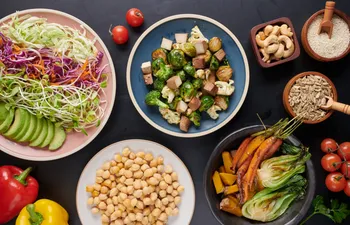Introduction
Explanation of vegetarian diets
Vegetarian diets are becoming increasingly popular due to concerns about animal welfare, health benefits, and the environmental impact of meat production. A vegetarian diet is a way of eating that excludes meat, fish, and poultry. However, there are still ways for vegetarians to get enough protein, which is essential for building muscles, repairing tissues, and maintaining a healthy immune system.
Importance of protein in vegetarian diets
Protein is an important nutrient that is often associated with animal-based products like meat, fish, and eggs. However, plant-based sources of protein can be just as beneficial, providing all the essential amino acids that our bodies need. According to the Academy of Nutrition and Dietetics, vegetarians who eat a variety of foods can meet their protein needs without supplements.
Necessity for affordable options
Eating vegetarian does not have to be expensive. In fact, many plant-based proteins are affordable, making them an accessible option for people on a budget. This article will discuss 10 cheap and nutritious vegetarian protein sources that can help vegetarians build a healthy plant-based diet without breaking the bank.
II. Cheap and Nutritious Plant-Based Protein Sources
A) Lentils:
Lentils are a versatile and affordable source of protein, with one cup cooked containing 18 grams of protein. They can be used in a variety of dishes such as soups, stews, curries, and salads. Lentils are also rich in fiber, iron, and other nutrients that promote good health. Cooked lentils cost approximately $0.35 per cup, making them an affordable protein option for vegetarians on a budget.
B) Chickpeas:
Chickpeas, also known as garbanzo beans, are another affordable source of plant-based protein. One cup cooked contains 14 grams of protein, along with fiber, iron, and other nutrients. Chickpeas can be used in a variety of dishes such as hummus, salads, soups, and stews. Cooked chickpeas cost approximately $0.35 per cup, making them an affordable protein option for vegetarians on a budget.
C) Tofu:
Tofu is a soy-based product that is rich in protein, with one block containing up to 20 grams of protein. It can be used in a variety of dishes such as stir-fries, salads, and sandwiches. Tofu is also a good source of calcium, iron, and other nutrients. While some forms of tofu may be more expensive, firm or extra-firm tofu generally costs around $1 per block.
D) Peanut butter:
Peanut butter is a delicious and affordable source of protein that can be used in a variety of dishes such as sandwiches, smoothies, and oatmeal. Two tablespoons of peanut butter contain approximately 8 grams of protein, along with healthy fats and fiber. Peanut butter is also rich in vitamins and minerals such as magnesium, potassium, and vitamin E. One jar of peanut butter costs approximately $2-$3, making it an affordable protein option for vegetarians on a budget.
E) Quinoa:
Quinoa is a gluten-free grain that is rich in protein, with one cup cooked containing 8 grams of protein. It can be used as a substitute for rice or pasta in a variety of dishes such as salads and stir-fries. Quinoa is also rich in fiber, iron, and other nutrients. While some forms of quinoa may be more expensive, most varieties cost approximately $2-$3 per pound.
F) Black beans:
Black beans are a versatile and affordable source of protein, with one cup cooked containing 15 grams of protein. They can be used in a variety of dishes such as burritos, chili, and soups. Black beans are also rich in fiber, iron, and other nutrients. One can of black beans costs approximately $0.75-$1, making them an affordable protein option for vegetarians on a budget.
G) Edamame:
Edamame is a soy-based product that is rich in protein, with one cup cooked containing up to 17 grams of protein. It can be used as a snack or added to salads and stir-fries. Edamame is also rich in fiber, iron, and other nutrients. One bag of frozen edamame costs approximately $2-$3, making it an affordable protein option for vegetarians on a budget.
H) Lentils:
Lentils are a versatile and affordable source of protein, with one cup cooked containing 18 grams of protein. They can be used in a variety of dishes such as soups, stews, and salads. Lentils are also rich in fiber, iron, and other nutrients. One pound of dried lentils costs approximately $1-$2, making them an affordable protein option for vegetarians on a budget.
I) Almond butter:
Almond butter is a delicious and affordable source of protein that can be used in a variety of dishes such as sandwiches, smoothies, and oatmeal. Two tablespoons of almond butter contain approximately 7 grams of protein, along with healthy fats and fiber. Almond butter is also rich in vitamins and minerals such as magnesium and vitamin E. One jar of almond butter costs approximately $3-$4, making it an affordable protein option for vegetarians on a budget.
J) Tempeh:
Tempeh is a soy-based product that is rich in protein, with one block containing up to 16 grams of protein. It can be used in a variety of dishes such as stir-fries and sandwiches. Tempeh is also rich in fiber, iron, and other nutrients. While some forms of tempeh may be more expensive, most varieties cost approximately $2-$3 per pound.
K) Peas:
Peas are a versatile and affordable source of protein, with one cup cooked containing 8 grams of protein. They can be used in a variety of dishes such as soups and stews. Peas are also rich in fiber, iron, and other nutrients. One pound of frozen peas costs approximately $1-$2, making them an affordable protein option for vegetarians on a budget.
FAQ Section
Q: What are some affordable plant-based protein sources that can be incorporated into meals to support muscle growth and repair?
A: Lentils, almond butter, edamame, peas, tempeh, chia seeds, quinoa, hemp seeds, peanut butter, black beans, chickpeas, soybeans, spinach, kale, broccoli, avocado, and sweet potatoes are all affordable plant-based protein sources that can be incorporated into meals to support muscle growth and repair. These foods are rich in protein, vitamins, minerals, and fiber and can be used in a variety of dishes such as soups, stews, salads, sandwiches, and snacks.
Q: How much protein do I need each day to support muscle growth and repair?
A: The amount of protein you need each day to support muscle growth and repair depends on factors such as age, activity level, and body weight. Generally, it is recommended that adults aim for 0.8-1.2 grams of protein per kilogram of body weight each day. For example, a person who weighs 75 kg (165 lbs) should aim for between 60-84 grams of protein per day.
Q: How can I ensure I'm getting enough protein in my vegetarian diet?
A: To ensure you are getting enough protein in your vegetarian diet, it’s essential to eat a variety of plant-based protein sources throughout the day. Additionally, consider pairing complementary proteins (such as beans and rice) at meals to provide all nine essential amino acids needed for muscle growth and repair. It's also important to incorporate high-protein snacks such as almond butter, chia seeds, or edamame throughout the day to help meet daily protein requirements.
Q: What are some delicious vegetarian meals that are high in protein?
A: Here are a few examples of delicious vegetarian meals that are packed with protein:
- Chickpea curry with quinoa and spinach
- Lentil soup with avocado and whole grain bread
- Black bean burrito bowl with brown rice, sweet potatoes, and salsa
- Tofu stir fry with broccoli, mushrooms, and brown rice
- Chia seed pudding with almond milk and berries
Q: How can I ensure I'm getting enough iron in my vegetarian diet to support muscle growth?
A: Iron is essential for muscle growth because it helps transport oxygen to the muscles. However, plant-based sources of iron are less bioavailable than animal-based sources. To ensure you're getting enough iron in your vegetarian diet, incorporate iron-rich foods such as spinach, kale, lentils, and fortified cereals into meals, and pair them with vitamin C-rich foods to enhance absorption (such as oranges, bell peppers, or strawberries). Additionally, consider taking an iron supplement if your blood tests show low iron levels.
Q: What are some high-protein vegetarian snacks that are easy to pack and eat on the go?
A: Here are some high-protein vegetarian snacks that are perfect for packing and eating on the go:
- Almond butter packets with apple slices or whole grain crackers
- Roasted chickpeas seasoned with spices such as paprika, garlic powder, or sea salt
- Trail mix with nuts, seeds, and dried fruit
- Rice cakes topped with almond butter and banana slices or peanut butter and jelly
- Energy balls made with dates, nuts, and protein powder
Q: What are some vegan sources of protein that can help with muscle growth?
A: For those following a vegan diet, it's still possible to get enough protein for muscle growth. Here are some vegan sources of protein to consider incorporating into your meals:
- Tofu or tempeh (both made from soybeans)
- Chickpeas, lentils, and black beans
- Quinoa, hemp seeds, and chia seeds
- Nut butter made from almonds, peanuts, or cashews
Spirulina, a blue-green algae that's high in protein. It can be added to smoothies or taken as a supplement.
Remember, it's essential to consume enough calories and protein throughout the day to support muscle growth, regardless of dietary restrictions. Aim for at least 1 gram of protein per pound of body weight daily, and always consult with a healthcare provider or registered dietitian for personalized nutrition advice.
Conclusion
In summary, there are many affordable plant-based protein sources that can be incorporated into meals to support muscle growth and repair. These include lentils, almond butter, edamame, peas, tempeh, chia seeds, quinoa, hemp seeds, peanut butter, black beans, chickpeas, soybeans, spinach, kale, broccoli, avocado, and sweet potatoes. These foods are not only rich in protein but also packed with essential vitamins, minerals, and fiber that promote overall health and well-being. By including a variety of these foods in meals, vegetarians can ensure they are meeting their daily protein requirements without breaking the bank.











